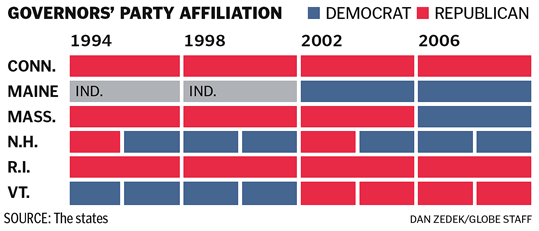 By Sasha Issenberg
By Sasha Issenberg CEDAR CREEK, Texas - Invigorated by state house victories earlier this month in Virginia and New Jersey, Republicans are turning their attention to governorships in New England, where they believe the retirement of four incumbents and a competitive race in Massachusetts has created wide-open opportunities.
Even though the GOP is a weak presence in the region’s national politics - no Republican congressmen and only three GOP senators represent New England in Washington - its leaders said at a national meeting last week in Texas that they are preparing a well-funded effort to contest a crowded slate of governors’ races in 2010.
All New England chief executive jobs will be on the ballot next year. In Vermont, Connecticut, and Rhode Island, Republican governors will be leaving office, as will Democrat John Baldacci of Maine. Only in New Hampshire, where Democrat John Lynch has yet to draw a serious Republican challenger, does an incumbent appear cer tain to stay on next November.
The competition to fill the open posts - and to unseat Massachusetts Governor Deval Patrick - has energized Republicans who see new promise running as an out-of-power party at a moment of voter anxiety.
“We’re talking about jobs and solutions, and seeing the results from Virginia and New Jersey proves it works,’’ said Matt Jacobson, the president of Maine & Company, a business group, and one of 22 announced candidates for the state’s governorship.
A political newcomer, Jacobson attended a “candidate school’’ sponsored by the Republican Governor’s Association this summer. There, he refined basic skills like how to be a more confident fund-raiser.
Last week, at a hotel outside Austin, Texas, where the RGA was meeting, Jacobson said he was excited to learn from governors-elect Bob McDonnell and Chris Christie, whose campaigns in Virginia and New Jersey, respectively, have made them role models for class of 2010 recruits.
“They talked about issues and solutions,’’ said Jacobson. “This wasn’t a beauty pageant. This was about a clash of ideas.’’
Republicans nationwide have credited the RGA and its chairman, Mississippi Governor Haley Barbour, for playing a key role in this fall’s victories, through its advertising efforts and direct contributions to candidates. The group said this week that it already had more money on hand, about $25 million, for the 2010 cycle than it spent in 2006.
Barbour exudes confidence: “We can win anywhere, we really can,’’ he said.
Next year’s elections, however, will test the RGA’s reach: 37 governorships will be decided, 21 of them open.
Recruiting experienced candidates in New England has been a recurring challenge, party officials acknowledge, given the party’s inability recently to compete with Democrats in state-legislative or selectman elections.
While Republicans have struggled to enlist strong candidates in Connecticut and Rhode Island, they are confident they have the strongest possible standard-bearers in Vermont and Massachusetts, where health-industry executive Charlie Baker, who did not attend the RGA meeting, is challenging Patrick. Baker is a fiscal conservative who supports gay marriage and abortion rights, and he has selected an openly gay state senator, Richard Tisei, as his running mate.In Maine, Republicans have drawn a broad field, including 2006 state Senate candidate Peter Mills and ski mogul (and former Red Sox part owner) Les Otten.
Talk of “problem-solving’’ and “real-world solutions’’ are common platitudes at gatherings of governors, who fancy themselves pragmatic managers undistracted by Washington’s ideological struggles. But candidates nurtured by the RGA are getting a focused tutorial on how to be a Republican on turf typically won by Democrats in national elections.
“Stay focused on those bread-and-butter issues including jobs,’’ said Minnesota Governor Tim Pawlenty, the RGA’s vice chair, explaining the strategy. “In Minnesota, we get asked about how to advance the social issues, and I have views on that, as does most of my party, but we try to also present it in a way that is thoughtful, civil, respectful, and the tone of it isn’t harsh and judgmental and condemning.’’
New England’s current Republican governors have already mastered the practice of finding useful distance from their parties to sustain local support. Vermont Governor Jim Douglas, who is retiring, has been a supporter of President Obama’s stimulus. Rhode Island’s outgoing Republican governor, Donald Carcieri, said last week he might support domestic partnerships for gays.
“I think it’s like the Avis Rent a Car thing: you’ve got to work harder,’’ Vermont Lieutenant Governor Brian Dubie, who is running to succeed Douglas, said of being a New England Republican. “I’m not running for Congress, I’m not running for Senate, but I’m running for governor of Vermont, and I’ll work with any administration.’’
Republican strategists suggested their gubernatorial candidates were able this year to carry two states won by Barack Obama not so much by moving to the center, as by banishing disputes on social issues from the conversation. That approach, they said, allowed them to assemble the type of broad, center-right coalitions that have recently eluded congressional Republicans but offer the only formula for the party to prevail in New England.
“You had very conservative, prolife Republicans voting for a prochoice candidate (Christie) and moderate, prochoice Republicans voting for Bob McDonnell,’’ said Barbour. “This election stood for the proposition that Republicans will stick together when they’ve got quality candidates, whether they’re moderate candidates or conservative.’’
Democrats are drawing up strategies to tap into voter discontent. In both Connecticut and Rhode Island, Republicans have controlled governorships for nearly 15 years, offering Democrats an advantage in a year when voters are expected to express their antipathy toward incumbents, said Democratic Governors Association executive director Nathan Daschle.
“One thing about governor’s races that’s different from the House and the Senate is they’re tough to nationalize,’’ said Daschle. “What happens in these races doesn’t have anything to do with President Obama or what’s going on in Congress.’’

No comments:
Post a Comment